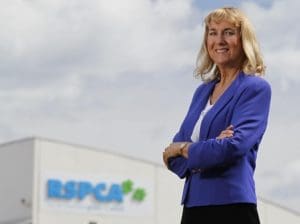
RSPCA WA chair Lynne Bradshaw
The RSPCA’s WA branch has hit back at a WAFarmers claim it has an ‘anti-livestock’ agenda, reiterating its opposition to the granting of a live export licence to Rural Exports and Trading WA.
RSPCA WA chair Lynne Bradshaw said WA Farmers’ export committee chair Jeff Murray wouldn’t be fooling many sheep farmers with his “latest rant and baseless accusations about the RSPCA”.
“They won’t be misled again with false assurances that everything’s fixed in the live sheep trade,” she said.
In a letter to editors, Mr Murray said the RSPCA’ agenda is more ‘anti-livestock’ and ‘anti-meat’ than ‘pro-welfare’. He defended the RETWA licence approval, the new stocking density rules for live exports and cited recent low mortality rates on vessels.
Hoewever, Ms Bradshaw said Mr Murray defied logic by criticising RSPCA opposition to the recent granting of an export licence to Rural Exports and Trading WA (RETWA) and appeared to be suggesting that anyone who supports agriculture must automatically support the live sheep trade.
“The RSPCA is certainly opposed to RETWA’s licence approval and the decision to water down new animal welfare requirements made by the Department of Agriculture and Water Resources this month.”
WAFarmers is “hopelessly conflicted” – Bradshaw
Ms Bradshaw said not all sheep farmers in WA support live exports and WAFarmers “is hopelessly conflicted,” with its leadership heavily involved in the live sheep trade and unable to effectively represent farmers who aren’t part of that.
“It is the role of RSPCA to prevent animal cruelty and to advocate for the application of the most up to date animal welfare science.
“Mortality rates, upon which Mr Murray bases his assurances, haven’t been used to measure animal welfare for decades.”
She said relying on the dubious assertion that an animal’s welfare must be good simply because it didn’t die is precisely the reason the live sheep trade finds itself in the predicament it is in today.
“We’d rather rely on the advice of the Australian Veterinary Association.
“It is not the role of the RSPCA to support industries that are inherently cruel to animals involved,” Ms Bradshaw said.
“The live sheep trade is one of those industries.”
Ms Bradshaw said despite Federal Minister David Littleproud pledging a range of animal welfare improvements, including removing the bad operators.
“Now, just a few months later, what we are seeing from the Federal Government are broken promises through new regulations that are so weak they will do almost nothing to improve sheep welfare.”
Ms Bradshaw said Mr Littleproud said he would weed out the bad operators from the industry and “let the light shine in.”
“Now, letting the light shine in apparently means granting a licence to an exporter with strong connections to Emanuel Exports and an equally horrendous track record on mass animal mortalities.
“In 2004, RETWA had its export licence cancelled by former Agriculture Minister Warren Truss following a string of 25 high mortality voyages within a two-year period between 2000 and 2002.”
Stocking density rules ignore AVA advice
Ms Bradshaw said the 17.5 percent reduction in stocking density goes against AVA advice that live sheep exports to the Middle East between May and October should not take place due to the extremes of temperatures in the northern summer and, for the rest of the year, a stocking reduction of up to 28pc should be applied.
“The RSPCA is most definitely not satisfied with the mere 17.5pc reduction which means only half the sheep can lie down at any one time during the three to four-week voyage.”
She said on-board independent observers were crucial to maintaining public confidence in live exports after it was found the extent of the suffering and death of sheep in appalling conditions on Emanuel Exports voyages had been seriously downplayed in reports to the Federal regulator.
The department recently issued an export advisory notice detailing changes to conditions for the export of sheep by sea to the Middle East from November 1 until the implementation of revised Australian Standards for the Export of Livestock in 2019. This meant stocking densities for vessels carrying sheep to the Middle East via the Persian Gulf and Red Sea will 17.5 percent lower than the current ASEL and the agreed heat stress assessment plan recommended in the McCarthy Review. Vessels will also have to have pen air turnover independently verified by a qualified mechanical engineer.
Exporters are also required to comply with other changes recommended by Dr Michael McCarthy in his review of the conditions for the export of sheep to the Middle East during the northern hemisphere summer, including:
the notifiable mortality level for sheep exported by sea to the Middle East will remain at 1pc
independent observers will continue on every sheep voyage, reporting back daily to the department (including footage), to support verification and compliance activities.
- reducing the notifiable mortality level for sheep exported by sea to the Middle East from 2 to 1 per cent.
Click here to read Lynne Bradshaw’s letter
Click here to read Jeff Murray’s letter.

HAVE YOUR SAY